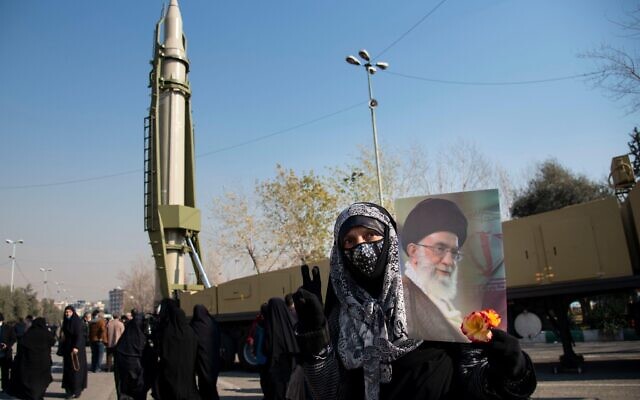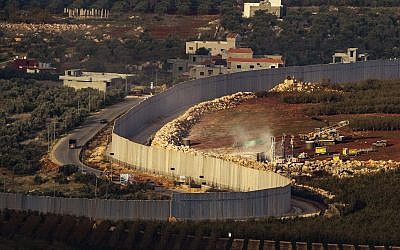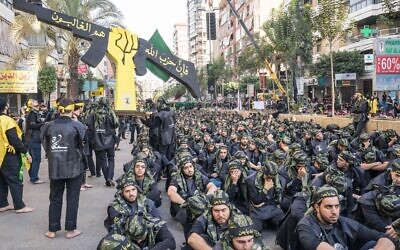Ex-National Security chief: Iran’s goal is a multi-front attack Israel ‘won’t survive’
"The Iranian conclusion is that maybe the time has come to destroy Israel in the next few years," former Israeli National Security Council chief told Jewish News.

The increasing provocations by Hezbollah on the Israeli-Lebanese border doesn’t mean the two enemies are on the verge of war, but the bigger picture tells a story of Iran and its proxies hoping to destroy Israel in the coming years, one of Israel’s top security experts told Jewish News in an interview on Monday.
The situation is “serious but it doesn’t necessarily mean we are on the verge of an immediate military confrontation,” Maj. Gen. (ret.) Giora Eiland, former head of Israel’s National Security Council and head of IDF Strategic Planning Branch, said.
But the bigger picture of Iran, and thereby Hezbollah, tells a different story: “The Iranian conclusion is that maybe the time has come to destroy Israel in the next few years.”
Eiland listed three developments in the Middle East in recent years that have accelerated Iran’s ultimate goal. Firstly, Iran is more “comfortable” in the international system due to restored ties with Saudi Arabia and greater cooperation with Russia.
Secondly, Eiland said, Iran has more “precise weaponry” at its disposal: “The past 40 years, Israel enjoyed this advantage. But today, Iran has accurate cruise missiles, suicide drones, and ballistic missiles with GPS censors that are much more accurate.”

The third development is the internal crisis in Israel. “They see Israel as getting weaker and weaker. Now this interpretation might not be true but that’s how they see it,” he said.
Eiland believes that Iran and Hezbollah are looking to accelerate the process what they see as Israel’s inevitable demise.
“Based on those developments, they believe that if they mange to arrange a simultaneous attack against Israel by Iran, Hezbollah in Lebanon, Hamas in Gaza, Shia militias in Syria, Iraq, and Yemen, and an uprising of Palestinians in the West Bank, this will be something that Israel won’t survive,” Eiland said.
In order to succeed with this goal, Iran and its proxies don’t have to provoke any military confrontation right now.
“It might even be premature, as far as they are concerned. Iran is not interested in a full scale war with Hezbollah today. Hezbollah also isn’t interested in that. They understand that a war might bring total devastation to Lebanon. And Israel certainly isn’t interested either,” Eiland said.

Eiland also said that Hezbollah is not a terrorist organisation. “It’s not true. Hezbollah is a political, religious, popular movement with strong roots in Lebanese society. But they have to justify their existence and the $800 million they receive from Iran. So they have to provoke Israel.”
Eiland said that Hezbollah leader Hassan Nasrallah, who spends most of his time in an underground bunker for fear of being assassinated by Israel, likes to “take risks.”
“Nasrallah believes he knows Israel very well, that he can control the volume of the conflict, predict the Israeli response, and create smaller provocations that will embarrass Israel and create fear in the north,” he said.
Eiland said that it’s a “dangerous” game that Hezbollah is playing due to the possibility of miscalculations: “And we have seen in the past what that can lead to.”
For Israel, the current strategy is to “contain” Hezbollah’s provocations, such as the noise bomb planted on the border fence earlier this month which scared off members of Hezbollah who were trying to damage the border fence.
But the increasing attempts to damage the border fence, Hezbollah members patrolling along the border, as well as a two tents erected by Hezbollah on Israeli soil in the contested Mount Dov region/Shebaa Farms, has brought Israel on high alert.
Last week, Nasrallah warned Israel to ‘beware of any stupid step or decisions of one kind or another, the resistance does not take its responsibility for responding and liberating lands, lightly. We are ready for any option and we will not remain silent in the face of any stupid act,” as tensions continued along the border.
Prime Minister Netanyahu responded to a threat by Nasrallah, saying: “It’s better for him not to put us to the test.”

Thank you for helping to make Jewish News the leading source of news and opinion for the UK Jewish community. Today we're asking for your invaluable help to continue putting our community first in everything we do.
For as little as £5 a month you can help sustain the vital work we do in celebrating and standing up for Jewish life in Britain.
Jewish News holds our community together and keeps us connected. Like a synagogue, it’s where people turn to feel part of something bigger. It also proudly shows the rest of Britain the vibrancy and rich culture of modern Jewish life.
You can make a quick and easy one-off or monthly contribution of £5, £10, £20 or any other sum you’re comfortable with.
100% of your donation will help us continue celebrating our community, in all its dynamic diversity...
Engaging
Being a community platform means so much more than producing a newspaper and website. One of our proudest roles is media partnering with our invaluable charities to amplify the outstanding work they do to help us all.
Celebrating
There’s no shortage of oys in the world but Jewish News takes every opportunity to celebrate the joys too, through projects like Night of Heroes, 40 Under 40 and other compelling countdowns that make the community kvell with pride.
Pioneering
In the first collaboration between media outlets from different faiths, Jewish News worked with British Muslim TV and Church Times to produce a list of young activists leading the way on interfaith understanding.
Campaigning
Royal Mail issued a stamp honouring Holocaust hero Sir Nicholas Winton after a Jewish News campaign attracted more than 100,000 backers. Jewish Newsalso produces special editions of the paper highlighting pressing issues including mental health and Holocaust remembrance.
Easy access
In an age when news is readily accessible, Jewish News provides high-quality content free online and offline, removing any financial barriers to connecting people.
Voice of our community to wider society
The Jewish News team regularly appears on TV, radio and on the pages of the national press to comment on stories about the Jewish community. Easy access to the paper on the streets of London also means Jewish News provides an invaluable window into the community for the country at large.
We hope you agree all this is worth preserving.





















